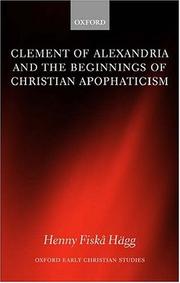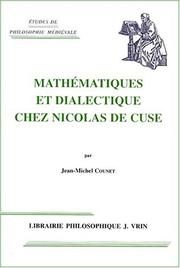| Listing 1 - 8 of 8 |
Sort by
|
Book
ISBN: 9780198932970 Year: 2024 Publisher: Oxford : Oxford University Press,
Abstract | Keywords | Export | Availability | Bookmark
 Loading...
Loading...Choose an application
- Reference Manager
- EndNote
- RefWorks (Direct export to RefWorks)
How can we live in harmony with the universe, and not just in it? What is it to feel at home in the world?Some thinkers who feel the force of these questions reach for the concept of God. Others do not. This book asks what might be at stake in the choice of whether or not to speak about God: not just in terms of abstract reasoning or arguments about God, but in relation to deeper undercurrents of motivation and yearning.The book is interested in sites in contemporary thinking, where the concept of the divine beckons, or looms, but also, perhaps, repels, or hides. It asks 'what is at stake' in the decision (if it is that) to talk about God and the divine, or not to do so, with a wide and deep curiosity about what this might include: reasons and arguments, certainly, but also more biographical, intuitive, and affective dimensions, including imagination, and feelings about what is valuable. Also relevant are unconscious drives and factors. Concepts can convince, or fail to convince, but, also, they can attract and repel.The book draws on both analytical and continental post-Kantian sources, treating individual thinkers such as Immanuel Kant, William James, Carl Jung, Karl Rahner, Albert Camus, Saul Kripke, Thomas Nagel, Derek Parfit, Karen Kilby, and Janet Soskice, as well as cultural movements such as modern paganism, new atheism, and humanism.'Natural theology' involves speaking about God without reference to revelation, tradition, or sources of authority, using the resources of 'reason alone'. 'Negative theology' is concerned with the way in which a type of abstract reasoning and rational argument run out, without this necessarily being an ending: other types of speech and communication may become possible and essential. Speaking into this space, the book draws on philosophy, theology, anthropology, literature, and psychology.
Book
ISBN: 2345001771 2711619680 9782345001775 Year: 2021 Publisher: Paris : Vrin,
Abstract | Keywords | Export | Availability | Bookmark
 Loading...
Loading...Choose an application
- Reference Manager
- EndNote
- RefWorks (Direct export to RefWorks)
La philosophie de Plotin se situe à la croisée de deux métaphysiques. La première culmine avec l’affirmation de l’identité entre l’être et la pensée : en introduisant les Formes intelligibles dans l’Intellect divin, elle conjugue platonisme et aristotélisme. La seconde inaugure un courant qui marquera durablement l’histoire de la philosophie occidentale, à travers notamment la tradition de la théologie négative. L’ontologie grecque est ainsi menée à son achèvement en même temps qu’elle est débordée par la position d’un au-delà de l’être, l’Un, et ébranlée par l’impensable extinction de l’être que représente la matière. La pensée se trouve aux prises avec deux figures du non- être, qu’il s’agisse de ce non-être par défaut qu’est la matière, ou du non-être par suréminence propre au premier Principe. Ce livre a donc pour objet de montrer qu’il ne s’agit chez Plotin ni d’une forme supérieure d’onto-théologie, ni de la sortie de la métaphysique à laquelle aspire tout un courant de la réflexion contemporaine, mais bien d’une nouvelle et autre métaphysique qui réussit à entrelacer infini et totalité. C’est ce nœud et cette tension entre deux métaphysiques, dont chacune engage une figure différente de l’altérité, que font apparaître des analyses patientes et éclairantes des textes des Ennéades. Cet ouvrage présente donc à la fois une réinterprétation de l’œuvre de Plotin et une réflexion profonde sur des problèmes qui, de Hegel à Heidegger et de Schelling à Levinas et Derrida, continuent encore et toujours d'inquiéter la pensée.
Classics --- Philosophy --- ontologie --- métaphysique --- aristotélisme --- platonisme --- théologie négative
Book
ISSN: 12428434 ISBN: 9782718607337 2718607335 Year: 2006 Publisher: Paris: Galilée,
Abstract | Keywords | Export | Availability | Bookmark
 Loading...
Loading...Choose an application
- Reference Manager
- EndNote
- RefWorks (Direct export to RefWorks)
Angelus Silesius, --- French literature --- Names --- Negative theology --- Derrida, Jacques --- Angelus Silesius, - 1624-1677 --- Théologie négative

ISBN: 9780199288083 0199288089 019160416X 1281154598 9786611154592 1435624165 0191537101 Year: 2006 Publisher: Oxford: Oxford university press,
Abstract | Keywords | Export | Availability | Bookmark
 Loading...
Loading...Choose an application
- Reference Manager
- EndNote
- RefWorks (Direct export to RefWorks)
Can humans know God? Can created beings approach the Uncreated? The concept of God and questions about our ability to know him are central to this book. Eastern Orthodox theology distinguishes between knowing God as he is (his divine essence) and as he presents himself (through his energies), and thus it both negates and affirms the basic question: man cannot know God in his essence, but may know him through his energies. Henny Fiska Hagg investigates this earliest stage of Christian negative (apophatic) theology, as well as the beginnings of the distinction between essence and energies, focusing on Clement of Alexandria in the late second century. Clement's theological, social, religious, and philosophical milieu is also considered, as is his indebtedness to Middle Platonism and its concept of God.
Negative theology --- Théologie négative --- Christianity --- History of doctrines. --- Christianisme --- Histoire des doctrines --- Clement, --- Theologie negative --- -276 =75 CLEMENS ALEXANDRINUS --- 231.133.11 --- Apophatic theology --- Via negativa (Theology) --- Theology --- Mysticism --- -History of doctrines. --- Griekse patrologie--CLEMENS ALEXANDRINUS --- Kenbaarheid van God --- Clemens, --- Clemens, Titus Flavius, --- Clément, --- Clemente, --- Klemens, --- Klēmens, --- Kliment, --- Titus Flavius Clemens, --- إكليمنضس السكندري --- 231.133.11 Kenbaarheid van God --- Théologie négative --- Christianity. --- 276 =75 CLEMENS ALEXANDRINUS --- Christianity&delete& --- History of doctrines --- Klēmēs, --- Negative theology - Christianity - History of doctrines. --- Theologie negative - Christianisme - Histoire des doctrines --- Clement, - of Alexandria, Saint, - ca. 150-ca. 215.
Book
ISBN: 9789042923478 9042923474 Year: 2010 Volume: 45 Publisher: Leuven: Peeters,
Abstract | Keywords | Export | Availability | Bookmark
 Loading...
Loading...Choose an application
- Reference Manager
- EndNote
- RefWorks (Direct export to RefWorks)
Negative theology --- Théologie négative --- Christianity --- History of doctrines --- Christianisme --- Histoire des doctrines --- Jesus Christ --- History of doctrines. --- Christianity. --- Théologie négative --- Negative theology - Christianity. --- Jesus Christ - History of doctrines.

ISBN: 271161817X 9782711618170 Year: 2006 Volume: 57 Publisher: Paris: Vrin,
Abstract | Keywords | Export | Availability | Bookmark
 Loading...
Loading...Choose an application
- Reference Manager
- EndNote
- RefWorks (Direct export to RefWorks)
Cognoscibilité --- 2 THOMAS AQUINAS:231 --- 2 THOMAS AQUINAS:231 Godsdienst. Theologie-:-God. De Deo uno et trino:--dogmatisch--THOMAS AQUINAS --- Godsdienst. Theologie-:-God. De Deo uno et trino:--dogmatisch--THOMAS AQUINAS --- Negative theology --- God --- Théologie négative --- Dieu --- History of doctrines --- Name --- Knowableness --- Histoire des doctrines --- Nom --- Thomas, --- Thomas d'Aquin (saint ; 1225-1274) --- Théologie négative --- Thèses et écrits académiques --- Moyen âge

ISSN: 02497921 ISBN: 2711614603 9782711614608 Year: 2000 Volume: 80 Publisher: Paris: Vrin,
Abstract | Keywords | Export | Availability | Bookmark
 Loading...
Loading...Choose an application
- Reference Manager
- EndNote
- RefWorks (Direct export to RefWorks)
Mathematics --- Dialectic --- Philosophy, Medieval --- Theology --- Mathématiques --- Dialectique --- Philosophie médiévale --- Théologie --- Philosophy --- History --- Philosophie --- Histoire --- Nicholas, --- Philosophy, Medieval. --- Theologie negative. --- Philosophy. --- Mathématiques --- Philosophie médiévale --- Théologie --- Medieval philosophy --- Scholasticism --- Logic of mathematics --- Mathematics, Logic of --- Polarity --- Polarity (Philosophy) --- Chrypffs, Nicolaus, --- Cues, Nicolas de, --- Cues, Nikolaus von, --- Cusa, Nicolaus de, --- Cusano, Nicola, --- Cusano, Nicolò, --- Cusanus, Nicolaus, --- Khrypffs, Nicolaus, --- Krebs, Nicolaus, --- Kues, Nikolaus von, --- Kusánský, Mikuláš, --- Kuzańczyk, --- Kuzaneli, Nikoloz, --- Kuzanskiĭ, Nikolaĭ, --- Mikołaj, --- Mikuláš, --- Ni-ku-la Kʻu-sa, --- Nicholas de Cusa, --- Nicola, --- Nicolai, --- Nicolas, --- Nicolaus Cusanus, --- Nicolò, --- Nikolaĭ, --- Nikolaus, --- Nikolaus von Cusa, --- Nikoloz, --- Nikoloz Kuzanelis, --- Nikula Kʻu-sa, --- Николай, --- Кузанский, Николай, --- Cusano, Niccolò, --- Cusa, Nicolaas van, --- Nicolaas, --- Mathematics - Philosophy.

ISBN: 2701010721 9782701010724 Year: 1984 Volume: nouv. sér., 42. Publisher: Paris: Beauchesne,
Abstract | Keywords | Export | Availability | Bookmark
 Loading...
Loading...Choose an application
- Reference Manager
- EndNote
- RefWorks (Direct export to RefWorks)
Métaphysique --- Incarnation --- Negative theology --- Metaphysics --- Théologie négative --- Métaphysique --- History of doctrines --- Histoire des doctrines --- Eckhart, --- Mysticism --- Philosophy, Medieval --- #GROL:SEMI-248.2-05 Eckh --- 248 ECKHART, Meister, O.P. (1260-ca.1328) --- Medieval philosophy --- Scholasticism --- History --- Spiritualiteit. Ascese. Mystiek. Vroomheid--ECKHART, Meister, O.P. (1260-ca.1328) --- Eckart, --- Eckehart, --- Eckhart, Johannes, --- Ekharti, --- Ėkkhart, --- Mysticism - Germany - History - Middle Ages, 600-1500 --- Eckhart, - Meister, - -1327 --- Eckhart, johannes (1260-1327) --- Théologie négative --- Philosophy, Medieval. --- Christian fundamental theology --- Eckhart [Meister] --- Eckehart (Johann, dit Maître). --- Eckehart (Meister).
| Listing 1 - 8 of 8 |
Sort by
|

 Search
Search Feedback
Feedback About UniCat
About UniCat  Help
Help News
News